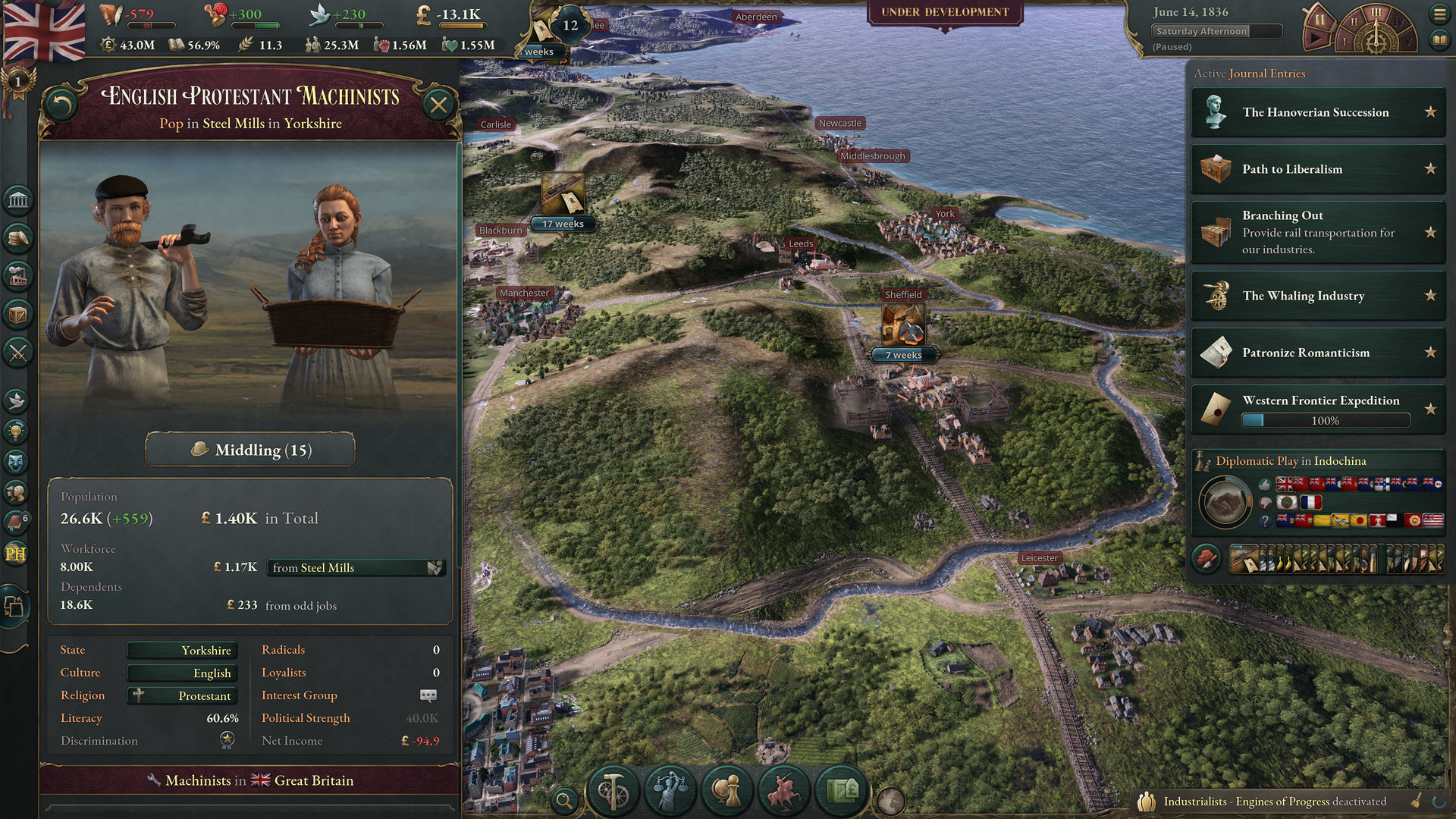Strategy games keep giving players the most depressing insights into real-world politics and economics
The political and economic lessons of games like Dwarf Fortress and Victoria 3 have one outcome: depression

As much handwringing as has been done over the idea of 'politics in video games' over the years, one thing's for sure: strategy games have never shied away from the topic. Politics - that is, the activities of state - are integral to any game about running a government, and everywhere from Victoria 3 to Dwarf Fortress, players keep finding themselves learning accidental, often depressing lessons about the political and economic systems that govern the real world.
A quick glance at any discussion forum for a government-focused strategy game will show you a bunch of thread titles that would be just as appropriate as headers in an anti-capitalist pamphlet. For example, from the Victoria 3 subreddit: "If your economy is laissez faire, continually staying in small wars really helps out."
In Victoria 3, you choose one of over 100 countries from the 19th and early 20th century and guide its government over the course of that historical time period. Naturally, that means choosing the direction of foreign and domestic policy. With all the other nations getting simulated, it's likely that a major war will break out at some point, and that means you're going to need a well-equipped military. But your nation can't just keep local military suppliers afloat while waiting for Franz Ferdinand to get assassinated. What's a nation's leader to do?
Too close to home

Well, as it turns out, forever wars are an extremely convenient way to support the kind of bloated military-industrial complex you need to be prepared to participate in a global armed conflict. You just need to "join small wars against impoverished nations overseas that present no threat," as the post linked above notes. "As long as your infamy level stays low enough you don't lose trade, you're golden. You can even just stay in a 'forever' war without any major battles to maintain mobilization." It's honestly incredible that a game set in the lead-up to WW1 can convey the forces driving global politics since the Cold War.
Victoria 3 in particular has grown kind of infamous for this sort of insight. A few months after the game's launch, a post titled "is capitalism itself a Ponzi scheme?" went up, lamenting that an industrial nation tends toward revolution if production begins to slow down. "Is it even possible to have a sustainable economy that doesn't generate radicals and revolutions without infinite growth?" Well, y'know, maybe it isn't.
These factors tend to mean that communism is a powerful strategy in Victoria 3. As the devs behind the game told our friends at PC Gamer, communism became OP for a very simple reason: "We just implemented the mechanics the way we understood them." Your capitalists will want you to bring in cheap raw materials from external colonies, but if you choose to instead empower your workers by investing in industry at home with robust social policies, designer Mikael Andersson said that "your lower classes will thrive, become empowered, and assert their rights to democracy, living wages, and humanitarian policies." That's all without any particular attempt from the developers to make communism powerful.
Of course, as Andersson noted, "while Victoria 3 is an ambitious simulation, it is not a complete simulation." In particular, it lacks modeling of factors like "corruption or cronyism, foreign economic influence beyond trade, or direct interference in another nation's politics," all of which would cause some big problems for strong central governments. But, as Homer Simpson would tell you, communism works - in theory.
Sign up to the GamesRadar+ Newsletter
Weekly digests, tales from the communities you love, and more
Fantasy epics, in the Homeric tradition
Capitalism also fails - again, in theory. Just ask Dwarf Fortress, a legendarily complicated simulation of a fantasy world where you lead a group of dwarves to establish a successful fortress. Despite the greed of dwarves in most fantasy media, the denizens of Dwarf Fortress effectively exist in what modern political texts would call anarchist communism, where there's no private property, and all members of a society work together according to their abilities in order to improve the holdings of the collective community.
Dwarf Fortress obviously doesn't have many of the real-world political factors that would make maintaining an anarcho-communist society challenging in the modern era, but it did at one point dally with capitalism. The results were so disastrous that the devs have sworn it off for over a decade.
There's a delightful little video on the whole thing you can see below, but in short, an old version of Dwarf Fortress attempted to implement a "Dwarven economy" with actual money and jobs to earn it. But it turns out that, in a society where essentials like food and housing are provided to the entire population for the betterment of the community, suddenly stripping those essentials away in order to support the creation of wealth does not work.
There are only so many jobs to go around in a dwarven fortress. That's fine until all dwarves need to be doing labor in order to afford the food and housing they need to live. Once a dwarf was unable to pay rent, they'd become homeless, a state that leads to depression, which makes it ever more difficult for a dwarf to hold down stable work. Dwarves would accrue debt, too, so you'd have situations where they'd be trapped in endless cycles of poverty and homelessness from which they'd never escape.
There were two primary solutions to these problems. Players would purposefully make bad housing and poor goods, so that they wouldn't be too expensive for your dwarves to afford. They'd also create functionally useless jobs like, say, building a room full of levers for dwarves to slide back and forth all day, just so those dwarves could make enough money to continue participating in an economy that provided no benefits to those who kept it running.
The kicker is that there were dwarves who were immune to the dangers of the economy. Nobles were able to buy anything they wanted with a literally infinite supply of money, so all the labor of normal dwarves was, in effect, creating goods and housing that had no use except to make the lives of an ultra-wealthy class a little bit more comfortable. (Haha, no, I'm not depressed about the upcoming relegation of my work to training material for the AI that will bring Google its next billion dollars in profit, why do you ask?)
Dwarf Fortress explains capitalism and @bullshitjobs better than most economics courses. pic.twitter.com/17uFbSCki8April 4, 2023
In the cases of both Victoria 3 and Dwarf Fortress, we're talking about "ambitious" simulations, not "complete" simulations. No video game can ever hope to fully simulate the various factors governing the political and economic systems that affect our lives - but that's not so different from the limitations of the models economists and political scientists used to create these systems in the first place. So if you want to expand your worldview a little bit, it might be time to dive into a strategy game and see what other worlds are possible.

Dustin Bailey joined the GamesRadar team as a Staff Writer in May 2022, and is currently based in Missouri. He's been covering games (with occasional dalliances in the worlds of anime and pro wrestling) since 2015, first as a freelancer, then as a news writer at PCGamesN for nearly five years. His love for games was sparked somewhere between Metal Gear Solid 2 and Knights of the Old Republic, and these days you can usually find him splitting his entertainment time between retro gaming, the latest big action-adventure title, or a long haul in American Truck Simulator.


